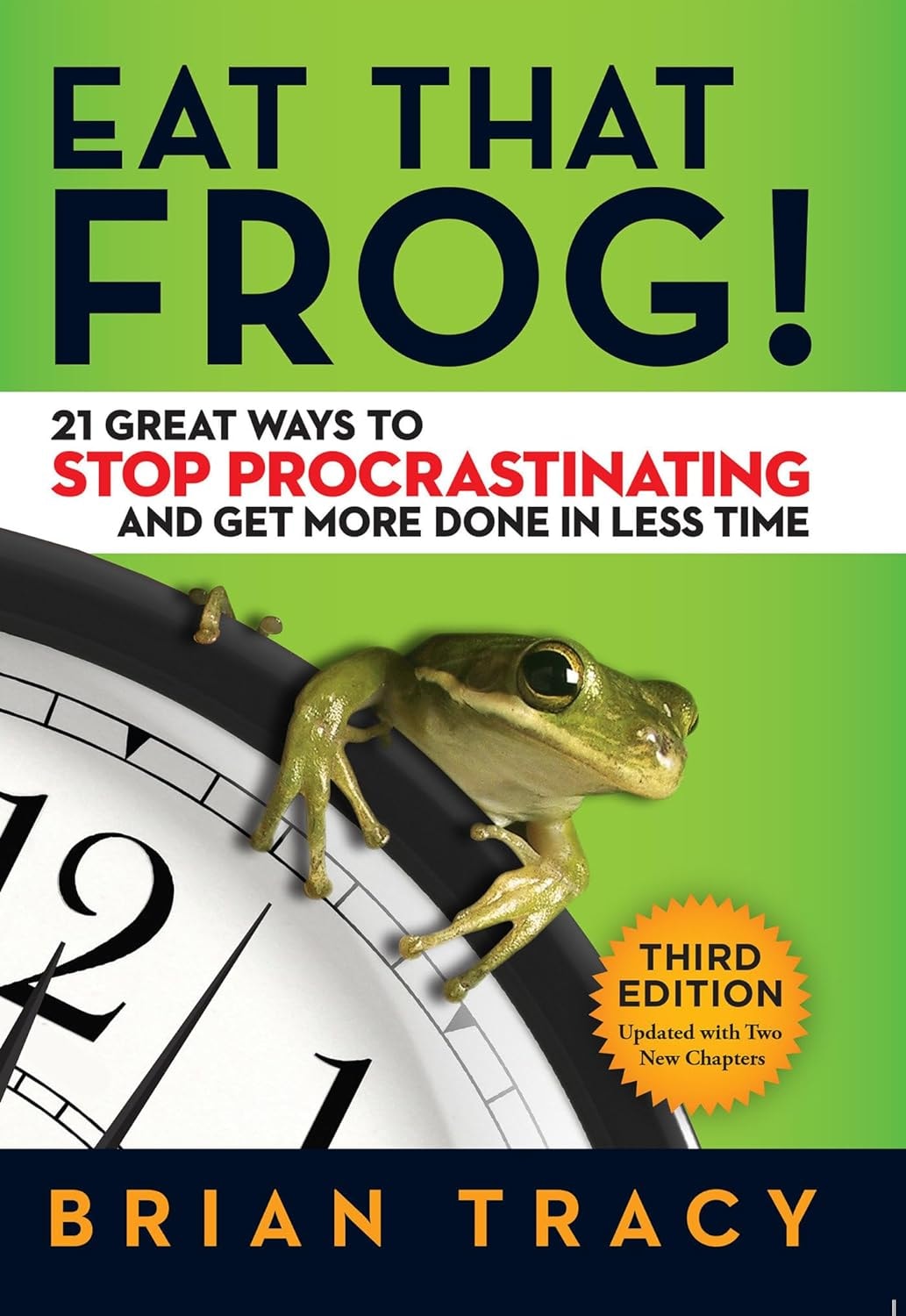The self-help genre could be called the “personal reflections and aggrandized subjective opinions” genre, but that’s too long to fit in an amazon keyword.
We here at Not Harder take an interest in productivity and advice about productivity, so today we’re taking a look at one of the most famous productivity books in the self-help genre, Eat That Frog!

What is Eat That Frog!?
Eat That Frog! is a Brian Tracy book about productivity published in 2001. Brian recommends that, if you have a live frog you must eat by the end of the day, you eat it first thing. This means taking care of your toughest, scariest tasks first.
The frog adage is famous for hustlers, girl bosses, and capitalism stans everywhere. But I take some issue with the book as a whole.
We’ll get into my beef with the frog, but first I’ll go over the tips that I liked.

The Best Advice from Eat That Frog! 2001
This book has some good content, though I disagree with the general framing of a lot of it. These were my favorite bits of advice from Brian Tracy’s Eat That Frog!
1. Set the Table
Tracy recommends that before you begin a project, you clearly define your goals and write them down. Identify exactly what you’re trying to do and what you want to achieve.
From there, break that project down into its separate steps, list those by priority, and focus on one task at a time.
I think that’s an effective way to begin a project or job, and this advice is solid.
Further, you can employ mise en place, especially for big tasks and projects.

2. Fake Deadlines: Stop Procrastinating
I love fake deadlines. They’re how I functioned all through college, and it’s how many successful people manage a stuffed schedule.
Essentially, you take a task or project that either has no deadline, or is due a bit later, and you self-impose an earlier deadline. Finishing things early gives you more time for edits and polishing, but, more importantly, it can dramatically lessen your overall stress because you will stop procrastinating.
Note: Be sure your fake deadlines don’t interrupt you working toward your real deadlines–do the first thing first when it comes to due dates.
4. The 80/20 Rule: Are you working on the most important task?
The 80/20 rule was coined by Vilfredo Pareto, so I don’t know how much we can really credit Tracy for including it, but it’s a good principle nonetheless.
Simply put, it means that 80% of output generally results from 20% of input. Applied to your work efficiency, 20% of your tasks produces 80% of your income.
Perform an 80/20 identification for your daily activities and see if you’ve been misallocating time and resources towards efforts that just don’t pay off.
5. The Law of Forced Efficiency
There is never enough time to do everything, but there is always enough time to do the most important things. Tracy emphasizes throughout this book that we should identify and focus on those tasks and activities that are more impactful for us, and I agree! Prioritization should be prioritized, 10/10.
6. Upgrade Skills
Tracy encourages readers to continuously improve our skills and knowledge to increase productivity and effectiveness. And hell yeah, keep learning, y’all.
Not only is it helpful to practice, learn, and study in our industry, but learning other key skills can make us more effective in our career overall, like time management, project management, and how to set clear goals.
7. Identify Your Constraints
Identifying the factors that limit your ability to achieve your goals, then creating a system to intentionally improve those areas of weakness, is great advice.
Self-awareness is step one, so take an inventory of factors that trip you up in your day-to-day life or workflow. After you’ve found those constraints, you can work to strengthen yourself in those areas.
8. Time Chunks
Tracy recommends chunking up your time (time blocking) to give yourself periods of direct focus without interruptions. Yes and absolutely, this is a great time management technique and can help you wrap up your work much quicker.
9. Whole-Ass One Thing
Tracy is anti-multitasking, and he’s right! Multitasking does not help. Focus on one thing at a time, and you’ll finish it quicker with better results. Often, we use multitasking as a form of procrastination, so stop procrastinating and get focused on one task until you’ve finished it.
This is a pretty solid list of advice! Now onto my gripes.

Problems With the Eat That Frog! Mentality
If you read this book and find it so helpful and relevant, that’s fab! It’s been constructive for many people for a long time. But here are some of my complaints.
1. One-Size-Fits-All
I find the book to be overly simplistic. In a book this short, that makes some sense, and I do love a simple point, but this is one reason it might not be a good plan for everyone to follow.
This one-size-fits-all mentality is common in the self-help genre, so I won’t harp on it too much, but I did want to mention one specific thing.
A point that the author stresses in the first chapter is that finishing tasks produces dopamine. This is simply untrue for a lot of people. Particularly people with ADHD and other conditions that affect your dopamine production, it just won’t work. This was also written in 2001, before everyone became technologically brainwashed–most people’s dopamine production is just…broken. Which is a problem on its own.
If you’re a neurotypical, traditionally employed person in the business sector (being white and male also wouldn’t hurt), this book is probably perfectly suitable for you, and you’ll likely find it very helpful. If you deviate from those particular circumstances, I wonder how constructive the prescriptivism really is for the general public.

2. Lack of Scientific Backing
Again, this is a common weakness in a lot of the self-help genre, but none of the claims in this book are scientifically backed. They’re based fully on anecdotal evidence, which isn’t necessarily a bad thing, but it does give us room to question the validity of these strategies for people outside of Brian Tracy’s class and professional circumstances.

3. “Willpower”
So the thing about willpower is it’s probably not…real? Psychologist, professor, and researcher Dr. Kirk Honda argues that willpower might not exist at all, at least not in a readily applicable sense. Honda advocates for highlighting external and internal factors rather than attributing difficulties solely to a lack of willpower.
Dr. Honda suggests creating systems rather than relying on the power of will:
As productivity app developer Sam Dowd said: “Discipline is bullshit. Or maybe it’s not, but I don’t know how to get it, and you don’t need it–you just need to lay out your gym clothes the night before.”
Systems and intentionality > willpower.
4. Contextual
This con is actually a huge pro in terms of publishing and marketing a self-help book, but Eat That Frog! relies heavily on the context of your situation. It’s really geared towards professionals in traditional business, not students, creatives, medical workers, self-employed people, or those in fields with different types of tasks, schedules, expectations, and power hierarchies.
This isn’t a bad thing–it’s great to focus on a niche, and not every book can be for every person–but this is something to keep in mind as you read through it yourself.

5. Productivity Porn
Now you know we aren’t going to let the hustle and grind theme of this book go unrecognized. Like I said, this is traditional-employment centric, and the author really stresses how important it is to work as hard as possible. “Do more than you’re paid for”–absolutely not. <3
He also pushes the idea that we should shove every moment full of work, like cramming on your train commute and waking up early to work extra hours from home. Yuck.
While I agree with his point that during working hours, you should strive to utilize those hours effectively, I disagree on the blanket premise that it’s always good to give as much effort as possible to your employer. They do not care about you.In the traditional job market, you are replaceable.
Performing well can lead to raises, promotions, and other incentives, but in the reality of today’s working world, that’s not often the case. Employers benefit from wringing you dry. As a general rule, they want to get as much work out of you for the smallest amount of money possible.
Stolen wages are cited as one of the largest forms of theft. Stolen wages are wages or benefits legally owed but withheld by employers through acts like unpaid overtime, minimum wage violations, off-the-clock work (like those meetings you’re not compensated for attending, or waking up early to work extra hours from home…), illegal deductions, misclassifying employees, and failure to provide paid breaks.
Depending on your situation, it might make a lot more sense to do exactly what you’re paid for, then direct the rest of your efforts towards building your own business or following your own passion.
Giving your all to an employer who doesn’t care if you live or die is NOT the vibe.

6. Neglects Root Causes of Procrastination
The Eat That Frog! principle applies well in a vacuum: Work hard, focus on the things that are most effective, and do your best job. But any type of procrastination, from perfectionism to writer’s block, comes from a source. As we said, we can’t rely on willpower to overcome the root issue. Why are you procrastinating?
Here are a few possible explanations that would require you to address the problem itself:
- fear (of failure, of success, of your boss, of your work, of yourself)
- perfectionism
- avoidance
- decision freeze
- trauma (of various kinds, often unrelated to the work itself)
- thrill-seeking (when procrastinators delay tasks until the last minute, relying on an adrenaline rush of the deadline to complete their work)
- overwhelm (even unrelated to the job or work itself)
So while this book might be helpful for those of us who genuinely need to be told to “just do it,” that’s simply rarely the case. You have to address the core reason you procrastinate, and this book doesn’t really lead you in how to do that.

7. Frog Legs Are Delicious
Maybe you haven’t tried eating frog before, so let me assure you that Louisiana Cajuns can make any creepy crawly taste stupid good. You don’t have to swallow a giant toad while it’s still kicking. You can humanely dispatch him, deep fry that dude, and dip him in spicy ranch.
What I’m saying is: Why force yourself to stomach something disgusting when you could use that energy to turn it into something you’re excited to eat?
Don’t put all of your effort and passion into a job that doesn’t serve you. Put it towards changing the job. You don’t have to keep swallowing the work, raw and wriggling–cook it and plate it with fries!

Alternatives for Eat That Frog!
The frog might not be your bag, so here are a few other options for prioritizing tasks:
1-3-5 Rule
The 1-3-5 Rule has you choose one Most Important task, three Medium Important tasks, and five Littler Tasks to pursue each day.
Ivy Lee Method
The Ivy Lee method involves making a to do list. It only has six items, and they are listed in order of priority. Whatever tasks are left by the end of the day are moved to the top spots to be your first tasks of your six tomorrow.
MITs
MITs–or Most Important Tasks–are exactly what they sound like! They’re the most important tasks. The MIT method instructs that you choose 3-5 big impact, very important tasks for the day and focus on those.
80/20 Rule or Pareto Principle
The 80/20 Rule (or Pareto Principle) claims that 80% of our effort goes toward 20% of our output, and vice versa. So the trick is to figure out what’s your 80 and what’s your 20 and adjust your workflow from there.
The ABCDE Method
The ABCDE Method involves sorting your tasks into five categories–
- A: Tasks that are very important and urgent
- B: Tasks that are important but not urgent
- C: Tasks that are nice to do but not critical
- D: Tasks that can be delegated to someone else
- E: Tasks that are irrelevant and should be eliminated
Work on the A tasks first, because they matter most.
Is Eat That Frog! a good book?
I mean, it’s aight. There are certainly other books that offer more dynamic, current advice for productivity, but ETF has a few good thoughts that might be worth the read for a traditionally employed person.
There are other ways to stop procrastinating, like the 2-minute rule, that might be more effective to apply.
Disclosure: We may earn a commission from some products purchased through links in our posts. This is at no additional cost to you, and recommendations are based on our honest opinions and experience.
2 Comments